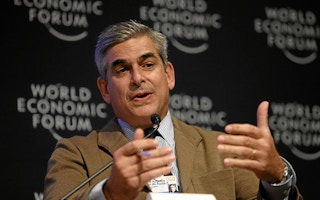Despite the fact that there are already some Filipino companies racing ahead on sustainability, experts at a recent conference said the Philippines is held back from achieving the sustainability development goals (SDGs) and a lack of policy certainty is largely to blame for this.
To continue reading, subscribe to Eco‑Business.
There's something for everyone. We offer a range of subscription plans.
- Access our stories and receive our Insights Weekly newsletter with the free EB Member plan.
- Unlock unlimited access to our content and archive with EB Circle.
- Publish your content with EB Premium.
On the sidelines of the United Nations Development Programme (UNDP) Regional Knowledge Exchange Conference held in Manila on October 4, sustainability reporting expert Bonar Laureto said that getting the support of the private sector for the achieving the SDG goals is attainable, but a much larger barrier is the threat to policy stability that every change in government administration brings.
Laureto, who is executive director of the Philippine Business for the Environment, explained that priorities of the previous administration get sidelined when someone new takes over. National and local elections are held every three years while the president and vice president are elected for a six-year term. The last general elections took place on May 9, 2016, for the executive and legislative branches for all levels of government.
“When they (the government) designs projects, it takes a while to implement—three to four years. At the end of that fourth year, when you’re on your way to implement it, things change…that’s really terrible for business,” Laureto told Eco-Business.
“
There are companies that have already been following the SDGs because it has been embedded in their core values and culture even before this talk about SDGs came out.
Bonar Laureto, executive director, Philippine Business for the Environment
National Economic and Development Authority (NEDA) undersecretary Rosemarie Edillon echoed these sentiments, and noted that it’s not just business that suffers from policy uncertainty, but rather, the entire nation.
In her speech at the conference, Edillon said sustainable development requires a “major governance reform” since short-term economic growth targets coincide with the terms of most political administrations. This means that only a limited number of people will benefit from the returns of each term, as a new administration creates a new set of targets.
Edillon added that integrating the SDG Agenda into the national strategy was another challenge for the Philippines because of issues such as access to poor communities and the proportion of Filipinos that needs help.
Developed countries only have a small population of poor people to care for, while developing and under-developed countries still have a sizable number that require special attention, Edillon explained.
“The cost of the infrastructure may be very high, owing to distance from the center, terrain, lack of local manpower and yet, may benefit only a few households,” she said.
However, she maintained that despite the barriers, the Philippines was taking the SDG goals very seriously.
Two years ago, the government initiated the Ambisyon 2040—the long-term vision of the Philippines to align with the 2030 Agenda and adapt it to the local context.
Leading the way
Even as the country works towards the SDGs, Philippines Business for Environment’s Laureto told Eco-Business that some local companies like mammoth conglomerate Ayala Corporation have long incorporated sustainable development objectives into their business.
The oldest conglomerate in the Philippines, Ayala Corporation was founded by the prominent Ayala clan 183 years ago. From a family-run partnership to a corporation in the late 1960s, it has expanded to property, banking, telecommunication, infrastructure, utilities, and recently, to its emerging businesses such as energy, health, education and automotive.
In its corporate sustainability report for 2016, Ayala Corporation states that it has always touched on the “basic needs of Filipinos from building sustainable communities throughout the country, to widening access to financial services, improving connectivity, providing clean potable water, and expanding beyond our shores to cater to the needs of a globalized economy.”
In the same report, Ayala Corporation shows how the company has been taking to action to advance the 17 UN-initiated sustainability development goals (SDGs), with initiatives like investments for poverty alleviation, loans to agri-business, affordable medicine and education, among others.
Ayala Corporation’s 2016 report is also the first annual report in the Philippines to adopt the integrated reporting framework, which details how a company’s capital and corporate behavior are aligned with the broader goals of financial stability and sustainable development.
Its other sustainability accolades include the recognition of its chairman and chief executive officer Jaime Augusto Zobel de Ayala as a UN sustainability champion at the UN Global Compact Leaders Summit in New York last September 21, the first such honour for someone from Southeast Asia.
Ayala Corporation’s sustainability accolades aside, a majority of firms in the Philippines are still catching up, said Laureto.
“We are not yet there. There are companies that have already been following the SDGs because it has been embedded in their core values and culture even before this talk about SDGs came out,” he added.
In total, about 32 local companies in the Philippines carry out sustainability reporting. But Laureto said that he is confident about seeing these numbers grow.
The UN is also optimistic about the outlook for the region.
“I am very confident for Asia,” said UN assistant secretary general Haoliang Xu during the conference.
He added: “What is now difficult is lining up the financing to support implementation, ensuring partnerships with private and public sector, and ensuring domestic and international goals. Otherwise, I think we are moving in the right direction.”










